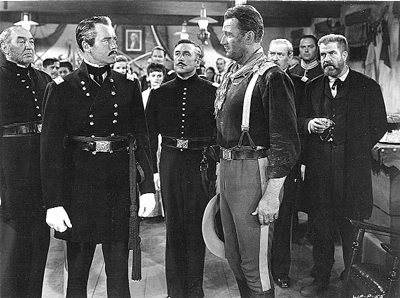Film Forum highlights 40 years of American westerns, when they were still escapist fantasies
Before the musical, before the gangster film, way before film noir, there was the western—American cinema’s original genre. Like any great archetype, the western film supports a near-infinite number of inflections, and as a closer look at Film Forum’s series “Essential Westerns 1924-1962” confirms, it yields to the queer eye with diverting ease.
Why westerns, when you could be seeing “Hitch”?
Film Forum’s roundup scores three counts for timeliness. First, these films are a late-winter salve, transporting frostbitten New Yorkers from our workaday squalor to breathtaking natural environs of prairie, river, mountain and sky. Second, the series unmistakably echoes the current Washington administration’s echt-cowboy mentality, with only the lightest sheen of urbane irony. Capping the series at 1962 allows for inclusion of reverent studio-era elegies such “Ride the High Country,” while conveniently omitting the subsequent cycle of bleakly revisionist “Vietnam Westerns.”
The most enticing reason, especially for queer audiences, is that “Essential Westerns” is a one-stop primer for this year’s anxiously anticipated release of Ang Lee’s “Brokeback Mountain,” now in post-production and poised to debut at Cannes in May. Annie Proulx’s middlebrow yarn about two good ole boys who pursue a passionate, down-low affair for 20 years somehow became one of Hollywood’s most coveted properties, changing numerous hands before docking with Lee, who directs Jake Gyllenhaal and Heath Ledger as the love-struck ranch hands.
Gay westerns are, by themselves, nothing new, the genre’s straight mythos already defiled in the studio heyday by Montgomery Clift’s pointedly homoerotic gunplay with John Ireland in “Red River” (1948), as well as the cross-dressing in “Johnny Guitar” (1954), with Joan Crawford and Mercedes McCambridge playing the “male” leads.
Andy Warhol conclusively queered the western with “Lonesome Cowboys” (1967), a soft-core porn oater with Factory superstar Viva swanning through the sagebrush as Taylor Mead trembles before studly cowpokes fornicating to their hearts’ delight. By the time of “The Missouri Breaks” (1976), Brando himself could slip into a petticoat and bonnet without raising an eyebrow.
These exceptions only prove the rule—that this all-American popular genre is intrinsically homoerotic. According to Leslie Fiedler’s celebrated argument in “Love and Death in the American Novel,” the western is founded on a regressive masculine flight from the civilized trappings of women and work, following either bosom male companions or an all-male surrogate family through a vividly fantasized wilderness. At heart, the western is a male romance, whether between social equals or the white cowboy and a Native American or Hispanic sidekick, imagined as projections of the cowboy’s “natural” self.
While grazing through the series calendar, be sure to spare time for two classics by Budd Boetticher, a studio auteur who touched glory in his late-50s cycle of westerns starring Randolph Scott. The finale to this cycle, “Comanche Station” (1960), contains one of the series’ most pronounced homo subtexts, discernable just beneath the surface narrative of the taciturn Cody (Scott), who pauses in his decade-long quest for his wife to rescue a young settler’s wife abducted by Comanches. Challenging Cody for the ransom is the desperado Lane (Claude Akins), head of a motley bunch of delinquents palpably more interested in each other than any financial reward.
Boetticher’s “The Tall T” (1957), based on a story by the young pulp maestro Elmore Leonard, is as hard and darkly glistening as onyx. Brennan (the iconic Scott) seeks to avenge the vicious double murder of his friends by Usher (Richard Boone) and his crew of marauding psychopaths. After Brennan dispatches the goons, the narrative is pared away to his primal clash with Usher—revealing an uncanny affinity between them, and crackling with a volatile heat barely sublimated onto the freshly widowed hostage Mrs. Mims (Maureen O’Sullivan). In both “The Tall T” and “Comanche Station,” the knaves Usher and Lane exude a stealthy, virile magnetism that undermines Scott’s old-school butch rectitude.
A 37-film bonanza like this needs some handicapping. Besides the Boettichers, here are the real essentials: Anthony Mann’s “The Naked Spur” and “The Furies,” Samuel Fuller’s “Forty Guns,” Howard Hawks’s “Rio Bravo,” Delmer Daves’ “3:10 to Yuma,” King Vidor’s “Duel in the Sun,” Raoul Walsh’s “Pursued,” Sam Peckinpah’s “Ride the High Country,” John Ford’s “The Man Who Shot Liberty Valance” and the 3-D presentation “Inferno.” In one of those signature Film Forum flourishes, the series culminates in a revival run of Peckinpah’s fabled western tragedy “Major Dundee,” in a new 35mm restoration.
gaycitynews.com

































